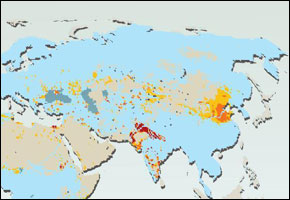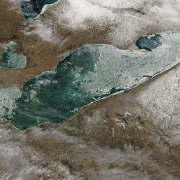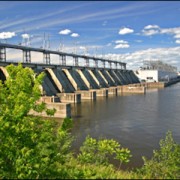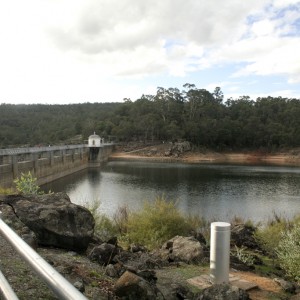Israeli Data Company Makes a Splash in the Water Industry
TaKaDu uses algorithms to save water, energy, and money for utility companies around the globe.
By Brett Walton
Circle of Blue
Located in an arid region of northern Chile, Antofagasta is a city in transition. Fueled by a mining boom in the nearby Atacama Desert, the city’s population has grown by 20 percent over the last decade to more than 360,000. Chilean statistical agencies predict that the population will push 500,000 by 2020.
With traditional water sources exhausted, the regional supplier, Aguas de Antofagasta, is investing heavily in desalination. The Pacific Ocean already provides more than 60 percent of the utility’s water supply, and, by 2014, the Antofagasta will become the first city in South America to rely solely on desalinated water.
But the utility is not only worried about creating fresh water from sea water, but also how to make sure that all of that water reaches its intended destination.
Currently, Antofagasta’s distribution system loses 23.5 percent of its supply to leaks, which, according to the World Bank, is a performance measure just under the global average of 30 percent loss. For Aguas de Antofagasta, however, the water waste cuts much deeper: the company squanders significant amounts of energy—and money—desalinating and pumping water that customers never see.
— Guy Horowitz,
TaKaDu Marketing V.P.
To improve the system’s efficiency and service quality, Aguas de Antofagasta has turned to TaKaDu, a small technology start-up based in Israel. After a brief trial period, the two companies officially announced a contract on May 18.
Not A Water Company
Founded in 2008 and employing 35 people, TaKaDu brings a different sensibility to the water sector.
“We really do not consider ourselves a water company,” said Guy Horowitz, vice president for marketing, in an interview with Circle of Blue. “The people who founded the company are from the telecommunications industry. Our foundation is in information technology.”
As is the trend for water aid organizations, TaKaDu uses its IT background to search for patterns in data that signify something is amiss with the water supply system. Early detection catches small problems before they turn into big ones, preventing a pipe leak from becoming a much costlier break.
TaKaDu’s service requires the installation of no additional equipment, though it has more appeal in areas where the water distribution system has a high sensor density, since more data makes identifying smaller leaks easier. TaKaDu offers a software solution that works with the data already collected by the utility—chunks of information on flow rates, water pressures, and sensor readings. (Water infrastructure monitoring, as TaKaDu calls it, oversees the water distribution system, not the water used by customers.) Data is uploaded to remote servers and analyzed to establish a baseline water-use profile. TaKaDu’s algorithms and mathematical models sift new data as it comes in to identify anomalies in real time.
By using the software, Aguas de Antofagasta hopes to reduce water loss by 3.5 percentage points within three years, saving 1.7 million cubic meters (450 billion gallons), according to the company’s general manager Marco Kutulas. Kutulas told Circle of Blue via email that the predicted electricity savings of 7,000 megawatt-hours per year represent 10 percent of the company’s annual use.
— Guy Horowitz,
TaKaDu Marketing V.P.
Because new water sources are more expensive to develop, utilities like Aguas de Antofagasta are looking to make better use of what they have. And there is a rising supply of data mavens who want to do just that.
“We’ve identified a new niche,” Horowitz said. “Water is a scarce resource, but it hasn’t received a lot of attention and innovation from investors.”
Small Company with Global Ambitions
The company’s global ambitions are evident in its name, which Horowitz said is a nonsense word selected precisely because, as far as the company knows, it doesn’t mean anything.
TaKaDu serves water utilities in Israel, Australia, Europe, and now Chile. Its largest client is Thames Water, which serves close to 9 million water customers and 14 million sewer customers in London. Horowitz said, in the next few weeks, the company will be announcing a contract with an even larger utility.
These new contracts come on the heels of some prestigious global recognition. Last fall, TaKaDu won a technology award from the World Economic Forum (WEF) and a sustainability award from the International Water Association for its Thames Water project.
It is also a member of the Smart Water Network Forum, a club for spreading the gospel about how data management can improve water systems.
Brett Walton is a Seattle-based reporter for Circle of Blue. Contact Brett Walton
Brett writes about agriculture, energy, infrastructure, and the politics and economics of water in the United States. He also writes the Federal Water Tap, Circle of Blue’s weekly digest of U.S. government water news. He is the winner of two Society of Environmental Journalists reporting awards, one of the top honors in American environmental journalism: first place for explanatory reporting for a series on septic system pollution in the United States(2016) and third place for beat reporting in a small market (2014). He received the Sierra Club’s Distinguished Service Award in 2018. Brett lives in Seattle, where he hikes the mountains and bakes pies. Contact Brett Walton










Maybe we can help in reducing waste water and save electricity, please check website.
thank you
Dario
Marvelous. Israel is well known for its water research and irrigation techniques.
Dr.A.Jagadeesh Nellore(AP),India
E-mail: anumakonda.jagadeesh@gmail.com